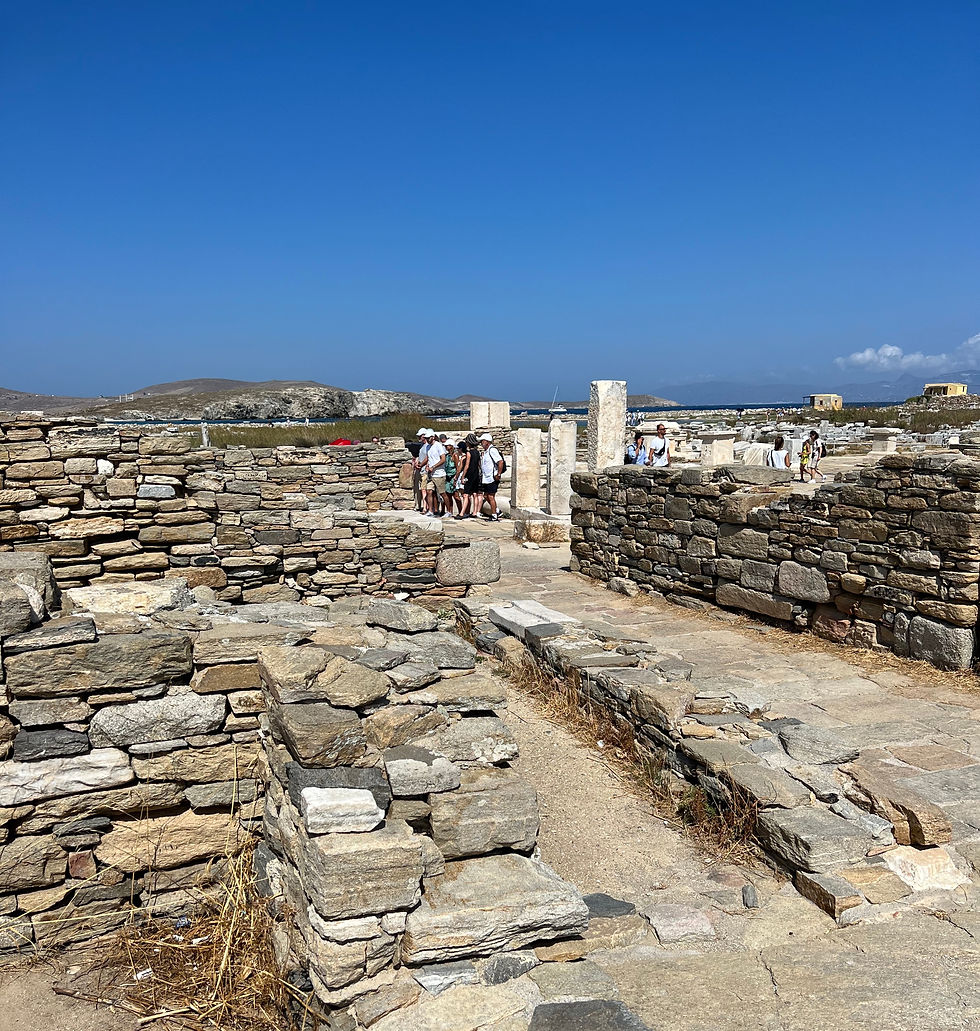Watching the bright orange life boats from the cruise ships shuttling their guests to Delos is fascinating. It is a constant back and forth. A total of 120’000 visitors come to Delos every year. This is a small number compared to the 5.7 million who visit the Acropolis. But still a lot for a remote place like Delos. Mykonos, the neighbor island attracts 1.4 million visitors a year.

Apollo and Artemis were born on Delos - and are now eternalised as Fridge Magnets
Always wondered how Delos became a holy island. The legends and history do not tell us a lot. There were temples already by 900 BC. The famous Lions of Delos, a present from the people from Naxos, arrived in the 7th century BC. But why did they pick this island? Wonder whether it has anything to do with the weather. Compared to the surrounding islands, Delos is remarkably calm. Tinos to the North protects it from the prevailing winds. Last night we noticed. Whilst the waters in Mykonos were choppy, whipped up by the Meltemi, our anchor place in Delos was calm – the sea almost flat. Maybe the Greek interpreted this as a sign of the Gods.

Wind Pattern today with low Wind Speed over Delos
Delos is an interesting place. It had religious, political and commercial functions over many centuries. The island started as a place of worship but ended up as the largest slave market in the Roman Empire. Ancient sources say that every day 10’000 slaves were sold here. It is a bit hard to believe. The Roman Empire with 50 million people had “only” 5 million slaves. I doubt that 3.6 million slaves p.a. were sold here.

The famous Naxos Lions are almost 3'000 years old - one guards the Arsenal in Venice
But the story points to the commercial importance of the island. The Greek Theatre with 5’000 seats - built in the 3rd century BC - indicates that Delos had around 50’000 inhabitants. We should think of Delos like of Lourdes – a pilgrim place where people met, worshipped, lived and traded. It was one of Apollo’s cult centers. The God of Light also protected against evil spirits, thus sick people must have pilgrimed here. Before Hippocrates, Greeks believed that diseases are caused by evil spirits. They came to sacrifice and to ask for protection.

Lion Mosaic from the Dionysus' House in Delos
Am sure they donated considerable amounts of money. The island was rich. So rich that its rulers did not have to leby taxes. Such tax privileges attracted business and commerce. No wonder the slave market moved here. Slaves were the most precious “commodity” in Roman times.

Delos with its Water Cisterns was a wealthy Town
As a general place of worship, with no armed forces, Delos was the ideal place to keep the treasury of the Ionian League – the Greek defense alliance against the Persians. Athens, the alliance leader, could pretend that the League was an alliance of equals. And Delos knew how to safekeep money – they already had quite a bit. Everyone was happy. Unfortunately, Athens run out of money when its silver mines depleted in the 4thcentury BC. It had to bring the treasury back. Delos lost its political role.

The Walls of the Theatre were built with great care
to mitigate the ever present risk of major earth quakes
In 87 BC, Delos faced a terrible end. In the war between Rome and Mithridates, the town was destroyed and then used by Cilician pirates as a base. The pirates were eventually defeated by Pompey in 66 BC. But it was too late. Delos never recovered.

The Remains of the Temple of Apollo on Delos
There are a few things I could not figure out though. Delos was the birthplace of Apollo and Artemis, but there is almost no sign of Artemis – only a very small temple. She was the most revered Goddess in ancient Greece. Her temple in Ephesus counted as one of the ancient wonders of the world. But on Delos, her birthplace, she is absent. What happened? Apollo was revered in more than one center. Delphi was dedicated to him, so was Didyma we visited a week ago.

Dionysus' Temple is decorated by two giant Phalli
to remind eveyone that he was also the God of Ecstasy
But Delos is the only religious site with a temple for Dionysus, the God of Wine – or more precisely, the God of Ecstasy. In my view, he was the door opener to the world of Gods. In their bacchanalia, Greek men got deliberately drunk and high and could tap the dizzy world of dreams, oracles, sightings and phantasies. So why not devote a temple to Dionysus to make sure the visitors got indeed access to Apollo?

The old Harbour of Mykonos is charming as ever - albeit the Fishing Boats have moved out
After our visit to Delos, we sailed back to Mykonos to visit the island’s main village. It changed little since 1973. What a positive surprise. The Mom and Pops shops are gone and have been replaced by souvenir shops and fashion stores. But the charming restaurants in the village’s streets are still the here. Am told that there are now many night clubs – we spent our days on the beaches thus I cannot comment. I can comment on the ice cream though – pistachio, black grapes and lemon are yum!

There are still lots of Restaurants in the Streets of the
Old Village of Mykonos




Comments